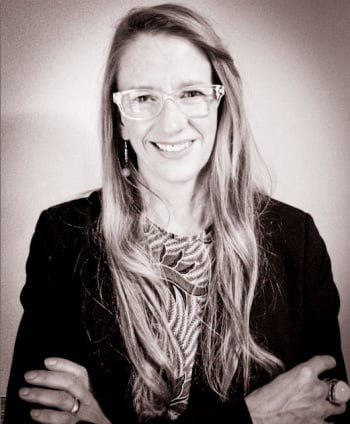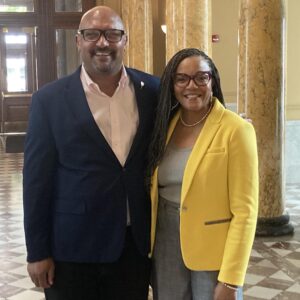“I do believe that Portland has started stagnating in terms of progressive transportation.”
— Leah Treat, incoming Director of PBOT
Last month I accepted an invitation from the Mayor’s office to be involved in the selection process for a new director of the Bureau of Transportation. The event was billed as a “meet and greet” and an opportunity to have informal, small-group discussions with each of the final candidates. Three finalists had already been through grilling formal interview and the City wanted to hear feedback from citizen transportation advocates. I gladly accepted and agreed to not share any details of the conversations until a final selection was made. One of the people we spoke to that day was Leah Treat, who we’ve now learned is Mayor Hales and Commissioner Novick’s ultimate choice for the job.
The first thing that impressed me about Treat was that before we (myself and three others) even started asking her questions, she opened up the conversation by asking each of us what our priorities were. What followed was an enlightening back-and-forth that ranged from Portland’s transportation stagnation, to equity, financing, and other issues. I made an audio recording of the event and the Q & A with Treat is below:

(Photo: PBOT)
I started things off by telling Treat that my top priority for the PBOT Director was that the person could come in and actually implement the goals and projects we’ve already adopted in myriad plans. At the rate we’re going, I shared, there’s no way we’ll meet the goals we’ve set for ourselves. We need someone who can move the needle on everything from better communication between PBOT and the public and getting more projects on the ground.
Here’s Treat’s response:
“I do believe that Portland has started stagnating in terms of progressive transportation (she also recounted a story from an earlier interview panel when someone thanked her for having the guts to come to Portland and tell us we’ve stagnated). It’s exciting to hear there are plans and ideas to be implemented and you’re just looking for someone to get things done.
One of the things I would do immediately if i were selected is put together a two-year action agenda for the department that would be based on community input from different stakeholders and what the mayor’s vision is for us to implement. [The agenda agenda] does two things: it clearly articulates to the citizens what you’re going to expect from us for the next two years and it also forces the department to work together as a team so all the different divisions are going to have to come together and coalesce around a goal. There will be a timetable, like a project management schedule and how we’re going to implement it, who’s going to implement it, who’s accountable and with clear time-frames. We’ll submit progress reports to the public on a six and 12-month basis about how we’re doing on what we said we were going to do.”
The questions below were asked by other citizens that participated in the interview process.
What kind of innovative financing would you bring to the table?
“I have a broad background in public/private partnerships and innovative financing and with the FHWA [Federal Highway Administration] there are all sorts of options through their innovative project delivery team. I also have a background in finding new revenue for departments; but it would really be based on what the mayor’s temperature would be to introduce new fees. In D.C. we were able to charge the utilities additional funds when they went into public right-of-way to cut in for new cables. In Chicago we have been able to get utilities to pay a premium if they want to cut into certain roads. It’s really the mayor’s temperature for charging different users or fees.”
How would you describe yourself in terms of playing well with others?
“I play very well in the sandbox. I could not have been put more to the test than I have in Chicago. There are 50 aldermen there. It’s 50 fiefdoms. I have a very good relationship with all of them, I’ve gone and met with them in their districts and have made personal relationships with them. During our budget hearings several of them stood up and personally acknowledged and thanked me. I was very proud of that.
I have worked in incredibly hostile environments and I don’t get my feathers ruffled. I have great ability to keep my cool. I don’t take things personally. It sounds corny, but I actually truly like people and would be happy to be engaged with the community here in Portland.”
If you had to pick one thing to bring to Portland from your years with Gabe Klein, what would it be?
“I would say bringing a sense of private sector urgency to the way we deliver civic services. That kind of urgency in getting projects done and being transparent about it.”
Do you have experience working on projects with disadvantaged communities and bring under-served communities into the fold?
“I believe Portland’s infrastructure should be managed on a condition assessment basis. There’s a useful life to our transportation infrastructure that you should plan for and manage on a financially rational basis. If there is completely missing infrastructure altogether that’s a problem for mobility for everyone in the community and I believe that’s an equity problem that needs to be addressed.”
Do you have experience addressing that problem?
“In Chicago one of the huge challenges at the the Department of Transportation is that all the general obligation bond money for transportation infrastructure goes to the aldermen. 50 of them split the pie and we give them a menu at the beginning of construction season and they get to pick their projects from hat menu. In the past they’ve said, ‘I really want to build a playground over here,’ so they take money set aside for transportation and do something for their community with it which leaves other resources under-served. So this year, we personally went out to each alderman and took our database with condition of assets and the list of customer service requests from citizens (like for sidewalks or ADA ramps) and we gave them suggestions of roads that need to be paved. It actually led to some of the alderman changing their mind about which projects they want to fund.”
At this point, I had turned off my recorder (because I didn’t think the question was relevant or interesting for the BikePortland audience). When it turned it back on we were talking about the issue of Portland’s stagnation.
Here’s Treat on how other cities are moving ahead in terms of bold transportation initiatives:
“You guys set the example and they latched onto what you did and they’ve taken it and run with it. Portland was the leader.”
How are we stagnating? What would you change?
“I don’t have the crystal ball answer. There’s a lot of things and it depends on whether you’re talking about modes of transportation or the role of the transportation department in the community. I think the public right-of-way has been incredibly undervalued and there are ways to partner with local businesses to take public right-of-way and make it an economic development opportunity for the business and for the city.
An example in Chicago is we take out a segment of five metered parking spaces and create pop-up public space. A business shares in the cost of construction and they get increased sales for their shops. So transportation has allowed it’s right-of-way to go into an economic development arena.”
Then I asked a follow-up question:
One of the problems we have in Portland is that PBOT has an irrational fear of the Portland Business Alliance. In fact, with one memo the PBA was able to force PBOT to not do their street seats/parklet program downtown in the central business district. Do you have experience working with intractable business groups?
“Yes. In launching bike share in Chicago we actually had businesses tell us they didn’t want bike share stations outside their business because they they wanted cars coming in. We were able to bring them research that local businesses actually get more money out of cyclists than they do from vehicles. The cyclists buy less every time they’re there but they buy more because they’re coming through every day so you actually get more business from a cyclist. There’s got to be some type of data out there that will support what you’re trying to do so you can make it seem rational and feed their interests as well.”
If you were queen for a day and in charge of the Transportation Bureau, what would you do?
“My first priority is to stand up the agency from the bottom up and make sure that I have talent inside the agency, and if I could do that with a magic wand I would. And to instill a sense of vision and mission with the agency and inspire each and every one of them to be excited about public service and what we do.”
Read more about Treat from The Oregonian’s City Hall reporter Brad Schmidt.







Thanks for reading.
BikePortland has served this community with independent community journalism since 2005. We rely on subscriptions from readers like you to survive. Your financial support is vital in keeping this valuable resource alive and well.
Please subscribe today to strengthen and expand our work.
She looks like Sophie from the movie Frances Ha http://www.imdb.com/media/rm241804288/tt2347569
Cautiously optimistic.
well versed in the language of bureaucracy
Jonathan, given the current clamor after the grossly misleading Oregonian article and Mayor Hales and other public figures repeatedly beating the gong for street repairs, what is your sense that Ms. Treat will make bikes and other active transportation a priority?
Things have changed considerably since those Oregonian stories and the mayoral campaign. Hales has shown great signs of supporting bicycling and walking over paving. And my sense that Treat will make bikes a priority? Very strong! She’s clearly a daily bike rider herself, she carts her kids around in a cargo bike, and she is a strong proponent of bicycles in the urban transportation mix.
That’s great to hear. Thanks for sharing your opinion, as closely as you track these issues, it carries considerable weight.
Thanks for sharing this prospective. I’m starting to catch up from the election….it does look like things are moving in a positive way. This announcement/interview is cool.
“…”Yes. In launching bike share in Chicago we actually had businesses tell us they didn’t want bike share stations outside their business because they they wanted cars coming in. We were able to bring them research that local businesses actually get more money out of cyclists than they do from vehicles. The cyclists buy less every time they’re there but they buy more because they’re coming through every day so you actually get more business from a cyclist. There’s got to be some type of data out there that will support what you’re trying to do so you can make it seem rational and feed their interests as well.” …Leah Treat
That’s the way to do it if the research is good, especially if the doubting businesses’ opposition to bike share was reversed.
Sounds like she knows what’s going on, and how to help things run smoothly.
How long has she been bicycling?
Also, besides the cargo bike, does she have her own bike? And, how long has she owned her own bike?
When did she master the unicycle? Was she able to ride it in reverse?
Has she ever taken the lane, and wore a helmet while doing so?
We need to know where she stands on helmets.
Has she ever trained bears to ride a bike?, we believe this is an indicator of her commitments to infrastructure we desire.
Welcome to Portland, Dir. Treat. You have left the big city, that is for sure.
Read my reply to chucklehead below.
Who cares? Maybe she has a disability and can’t cycle that much. Just because one does not ride a bike much does not mean they can’t support it. Heck, you may like to eat and go to restaurants all the time but can’t cook at all.
I’ve got 20k in bikes in my basement but haven’t been able to ride for 3 years doe to an injury. I also have a masters in transportation policy. Also interned (VERY long ago) at the Chicago Department of Environment and attended the Mayors Bicycle Advisory Committee meetings. Does my not riding somehow disqualify me from supporting bicycles?
You are simply looking for something to complain about.
My question was made with the assumption of her not having any disabilities. Did you read all the posts mentioning her? She rides a cargo bike.
Lack of time on a bicycle does not disqualify you from supporting bicycling, but it does disqualify you from being in a position that demands the ability to bring genuine innovations to the table in order for the state of bicycling to move forward.
In order to bring genuine innovations to the table, you need to have at least empathy towards bicyclists (including those who may have a disability). That empathy is developed over time on a bicycle.
What?
Don’t you think it’s presumptuous to state that “equity” issues are of no interest to us?